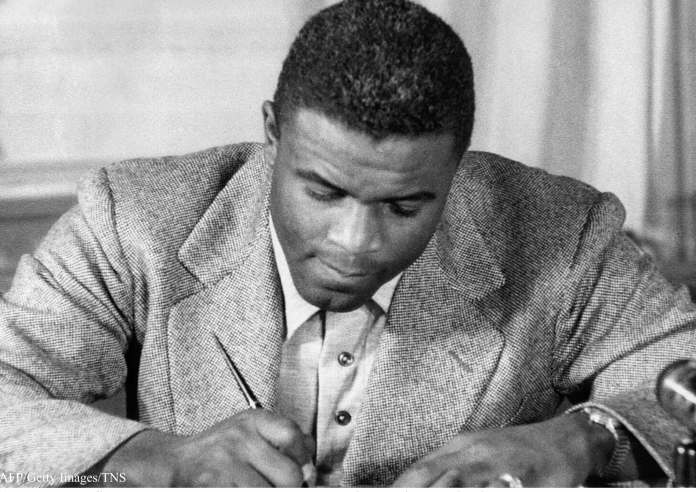On April 15, Major League Baseball celebrated Jackie Robinson Day, honoring the day, now 77 years ago, when Jackie Robinson broke the baseball color line by taking the field with the Brooklyn Dodgers. On the 15th, every player in baseball wore number 42, Robinson’s number, the only one ever retired by the entire league.
Robinson was the youngest of five children, born in Cairo, Georgia, into a family of sharecroppers. When his father abandoned the family, his strong mother found a way to get them to Pasadena, California, and work as a domestic in their own home.
Robinson grew up to be a stunning athlete, lettering in four sports at UCLA. Baseball, ironically, was his worst sport.
His triumph on the field and off took much more than athletic gifts.
As the first African American in major league baseball, he faced constant abuse. Opposing players threatened to strike, pitchers hurled bean balls at his head, and runners slid into him spikes up. He and his family received regular death threats in the mail. Opposing dugouts and fans hurled racist invectives at him.
In Florida spring training, Robinson had to stay apart from the team because local hotels would not accommodate him. Two ballparks locked the team out rather than let him on the field. In Sanford, Florida, fans ran the team out of the ballpark. When Brooklyn Dodger General Manager Branch Rickey praised a play Robinson made in the field, his minor league manager asked Rickey if he truly thought “a n—-r is really a human being.” Three prospective teammates petitioned the club to keep him off the team.
Robinson was a proud, fiercely competitive Black man. From a young age, he would challenge racial abuse. When he was in the military, years before Rosa Parks, he faced court martial when he refused to move to the back of a military bus. (He was tried and acquitted). Yet he promised Branch Rickey, the Brooklyn Dodger GM who had the courage to sign him, that he would not retaliate or respond to the racial bile heaped upon him. With discipline and courage, he kept that promise.
The racial abuse was expected. In many ways, a far bigger burden was that Robinson carried the hopes, the dreams, and the possibilities of an entire race on his shoulders.
**********
Thank you for reading an excerpt of Jesse Jackson’s article on scoopusamedia.com. To read more of the article, “Jackie Robinson Day,” please subscribe to Scoop USA Media. Print subscriptions are $75.00 and online subscriptions (Print, Digital and Vizion) are $90. (52 weeks/1 year)


